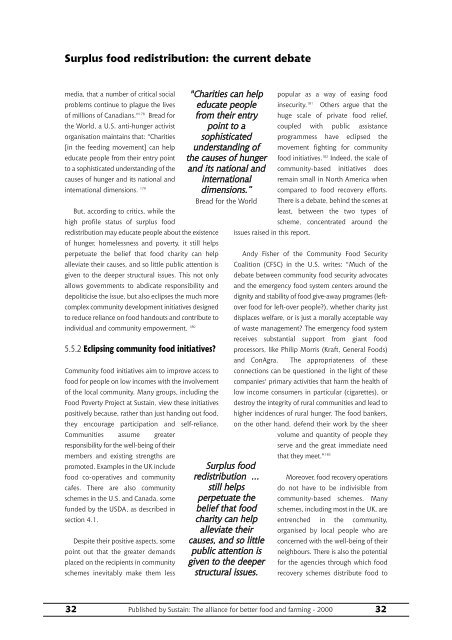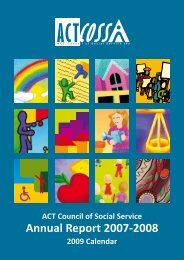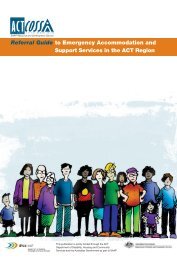Too much and too little? Debates on surplus food redistribution
Too much and too little? Debates on surplus food redistribution
Too much and too little? Debates on surplus food redistribution
Create successful ePaper yourself
Turn your PDF publications into a flip-book with our unique Google optimized e-Paper software.
Surplus <strong>food</strong> redistributi<strong>on</strong>: the current debate<br />
media, that a number of critical social<br />
problems c<strong>on</strong>tinue to plague the lives<br />
of milli<strong>on</strong>s of Canadians." 178 Bread for<br />
the World, a U.S. anti-hunger activist<br />
organisati<strong>on</strong> maintains that: "Charities<br />
[in the feeding movement] can help<br />
educate people from their entry point<br />
to a sophisticated underst<str<strong>on</strong>g>and</str<strong>on</strong>g>ing of the<br />
causes of hunger <str<strong>on</strong>g>and</str<strong>on</strong>g> its nati<strong>on</strong>al <str<strong>on</strong>g>and</str<strong>on</strong>g><br />
internati<strong>on</strong>al dimensi<strong>on</strong>s. 179<br />
But, according to critics, while the<br />
high profile status of <strong>surplus</strong> <strong>food</strong><br />
redistributi<strong>on</strong> may educate people about the existence<br />
of hunger, homelessness <str<strong>on</strong>g>and</str<strong>on</strong>g> poverty, it still helps<br />
perpetuate the belief that <strong>food</strong> charity can help<br />
alleviate their causes, <str<strong>on</strong>g>and</str<strong>on</strong>g> so <str<strong>on</strong>g>little</str<strong>on</strong>g> public attenti<strong>on</strong> is<br />
given to the deeper structural issues. This not <strong>on</strong>ly<br />
allows governments to abdicate resp<strong>on</strong>sibility <str<strong>on</strong>g>and</str<strong>on</strong>g><br />
depoliticise the issue, but also eclipses the <str<strong>on</strong>g>much</str<strong>on</strong>g> more<br />
complex community development initiatives designed<br />
to reduce reliance <strong>on</strong> <strong>food</strong> h<str<strong>on</strong>g>and</str<strong>on</strong>g>outs <str<strong>on</strong>g>and</str<strong>on</strong>g> c<strong>on</strong>tribute to<br />
individual <str<strong>on</strong>g>and</str<strong>on</strong>g> community empowerment. 180<br />
5.5.2 Eclipsing community <strong>food</strong> initiatives?<br />
Community <strong>food</strong> initiatives aim to improve access to<br />
<strong>food</strong> for people <strong>on</strong> low incomes with the involvement<br />
of the local community. Many groups, including the<br />
Food Poverty Project at Sustain, view these initiatives<br />
positively because, rather than just h<str<strong>on</strong>g>and</str<strong>on</strong>g>ing out <strong>food</strong>,<br />
they encourage participati<strong>on</strong> <str<strong>on</strong>g>and</str<strong>on</strong>g> self-reliance.<br />
Communities assume greater<br />
resp<strong>on</strong>sibility for the well-being of their<br />
members <str<strong>on</strong>g>and</str<strong>on</strong>g> existing strengths are<br />
promoted. Examples in the UK include<br />
<strong>food</strong> co-operatives <str<strong>on</strong>g>and</str<strong>on</strong>g> community<br />
cafes. There are also community<br />
schemes in the U.S. <str<strong>on</strong>g>and</str<strong>on</strong>g> Canada, some<br />
funded by the USDA, as described in<br />
secti<strong>on</strong> 4.1.<br />
Despite their positive aspects, some<br />
point out that the greater dem<str<strong>on</strong>g>and</str<strong>on</strong>g>s<br />
placed <strong>on</strong> the recipients in community<br />
schemes inevitably make them less<br />
""CChhaarriittiieess ccaann hheellpp<br />
eedduuccaattee ppeeooppllee<br />
ffrroomm tthheeiirr eennttrryy<br />
ppooiinntt t<str<strong>on</strong>g>too</str<strong>on</strong>g> aa<br />
ssoopphhiissttiiccaatteedd<br />
uunnddeerrssttaannddiinngg ooff<br />
tthhee ccaauusseess ooff hhuunnggeerr<br />
aanndd iittss nnaattiio<strong>on</strong>naall aanndd<br />
iinntteerrnnaattiio<strong>on</strong>naall<br />
ddiimmeennssiio<strong>on</strong>nss..””<br />
Bread for the World<br />
SSuurrpplluuss ffoooodd<br />
rreeddiissttrriibbuuttiio<strong>on</strong>n ......<br />
ssttiillll hheellppss<br />
ppeerrppeettuuaattee tthhee<br />
bbeelliieeff tthhaatt ffoooodd<br />
cchhaarriittyy ccaann hheellpp<br />
aalllleevviiaattee tthheeiirr<br />
ccaauusseess,, aanndd ssoo lliittttllee<br />
ppuubblliicc aatttteennttiio<strong>on</strong>n iiss<br />
ggiivveenn t<str<strong>on</strong>g>too</str<strong>on</strong>g> tthhee ddeeeeppeerr<br />
ssttrruuccttuurraall iissssuueess..<br />
popular as a way of easing <strong>food</strong><br />
insecurity. 181 Others argue that the<br />
huge scale of private <strong>food</strong> relief,<br />
coupled with public assistance<br />
programmess have eclipsed the<br />
movement fighting for community<br />
<strong>food</strong> initiatives. 182 Indeed, the scale of<br />
community-based initiatives does<br />
remain small in North America when<br />
compared to <strong>food</strong> recovery efforts.<br />
There is a debate, behind the scenes at<br />
least, between the two types of<br />
scheme, c<strong>on</strong>centrated around the<br />
issues raised in this report.<br />
Andy Fisher of the Community Food Security<br />
Coaliti<strong>on</strong> (CFSC) in the U.S. writes: "Much of the<br />
debate between community <strong>food</strong> security advocates<br />
<str<strong>on</strong>g>and</str<strong>on</strong>g> the emergency <strong>food</strong> system centers around the<br />
dignity <str<strong>on</strong>g>and</str<strong>on</strong>g> stability of <strong>food</strong> give-away programes (leftover<br />
<strong>food</strong> for left-over people?), whether charity just<br />
displaces welfare, or is just a morally acceptable way<br />
of waste management? The emergency <strong>food</strong> system<br />
receives substantial support from giant <strong>food</strong><br />
processors, like Philip Morris (Kraft, General Foods)<br />
<str<strong>on</strong>g>and</str<strong>on</strong>g> C<strong>on</strong>Agra. The appropriateness of these<br />
c<strong>on</strong>necti<strong>on</strong>s can be questi<strong>on</strong>ed in the light of these<br />
companies' primary activities that harm the health of<br />
low income c<strong>on</strong>sumers in particular (cigarettes), or<br />
destroy the integrity of rural communities <str<strong>on</strong>g>and</str<strong>on</strong>g> lead to<br />
higher incidences of rural hunger. The <strong>food</strong> bankers,<br />
<strong>on</strong> the other h<str<strong>on</strong>g>and</str<strong>on</strong>g>, defend their work by the sheer<br />
volume <str<strong>on</strong>g>and</str<strong>on</strong>g> quantity of people they<br />
serve <str<strong>on</strong>g>and</str<strong>on</strong>g> the great immediate need<br />
that they meet." 183<br />
Moreover, <strong>food</strong> recovery operati<strong>on</strong>s<br />
do not have to be indivisible from<br />
community-based schemes. Many<br />
schemes, including most in the UK, are<br />
entrenched in the community,<br />
organised by local people who are<br />
c<strong>on</strong>cerned with the well-being of their<br />
neighbours. There is also the potential<br />
for the agencies through which <strong>food</strong><br />
recovery schemes distribute <strong>food</strong> to<br />
32 Published by Sustain: The alliance for better <strong>food</strong> <str<strong>on</strong>g>and</str<strong>on</strong>g> farming - 2000 32













